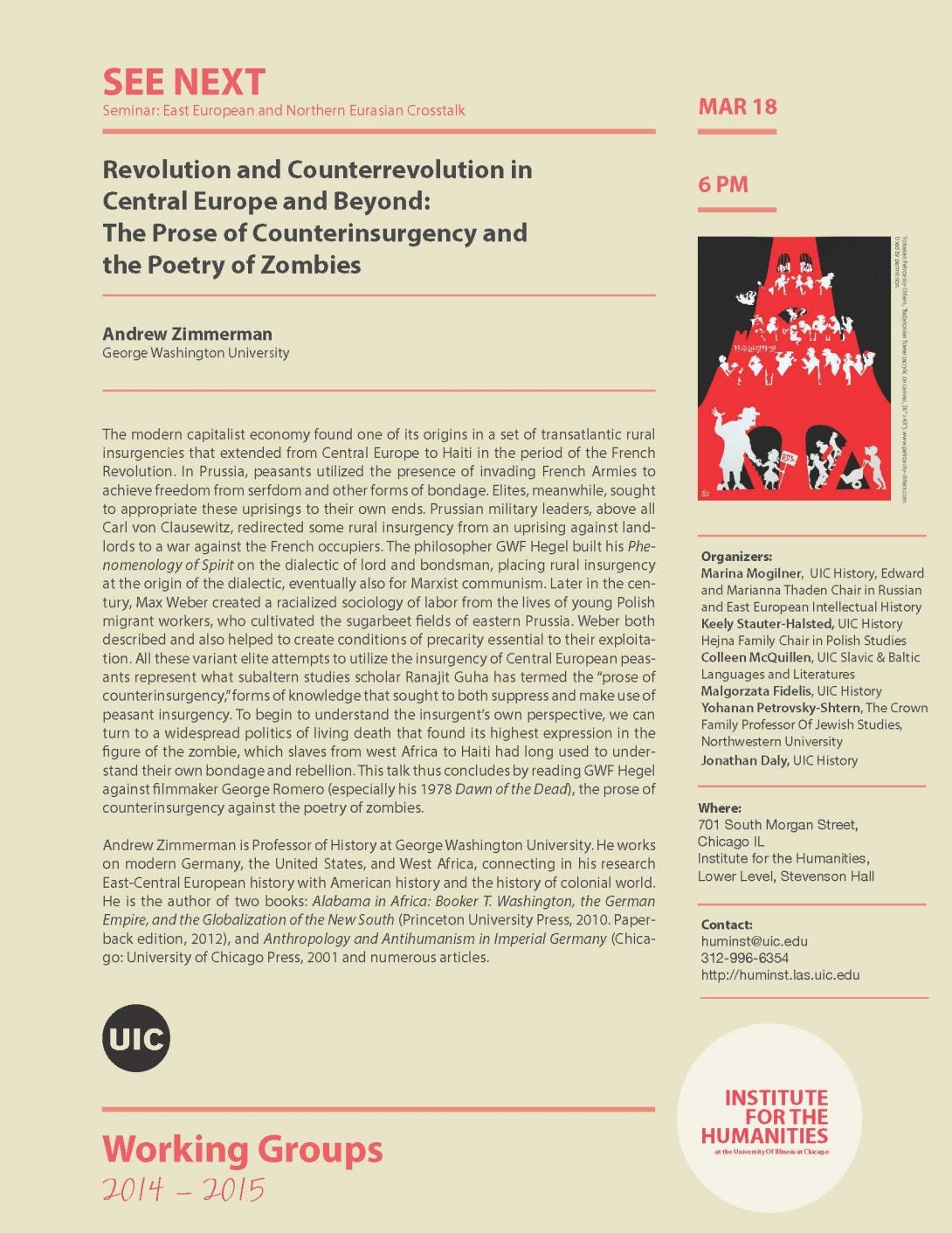Revolution & Counterrevolution in Central Europe & Beyond: The Prose of Counterinsurgency & the Poetry of Zombies
March 18, 2015
6:00 PM - 7:30 PM
Location
Institute for the Humanities, Stevenson Hall lower level
Address
701 S. Morgan St., Chicago, IL 60607
Calendar
Download iCal File
SEE NEXT
Seminar: East European and Northern Eurasian Crosstalk
Revolution and Counterrevolution in Central Europe and Beyond: The Prose of Counterinsurgency and the Poetry of Zombies
Andrew Zimmerman
George Washington University
The modern capitalist economy found one of its origins in a set of transatlantic rural insurgencies that extended from Central Europe to Haiti in the period of the French Revolution . In Prussia, peasants utilized the presence of invading French Armies to achieve freedom from serfdom and other forms of bondage. Elites, meanwhile, sought to appropriate these uprisings to their own ends. Prussian military leaders, above all Carl von Clausewitz, redirected some rural insurgency from an uprising against landlords to a war against the French occupiers. The philosopher GWF Hegel built his Phenomenology of Spirit on the dialectic of lord and bondsman, placing rural insurgency at the origin of the dialectic, eventually also for Marxist communism. Later in the century, Max Weber created a racialized sociology of labor from the lives of young Polish migrant workers, who cultivated the sugarbeet fields of eastern Prussia. Weber both described and also helped to create conditions of precarity essential to their exploitation . All these variant elite attempts to utilize the insurgency of Central European peasants represent what subaltern studies scholar Ranajit Guha has termed the “prose of counterinsurgency;’forms of knowledge that sought to both suppress and make use of peasant insurgency. To begin to understand the insurgent’s own perspective, we can turn to a widespread politics of living death that found its highest expression in the figure of the zombie, which slaves from west Africa to Haiti had long used to understand their own bondage and rebellion. This talk thus concludes by reading GWF Hegel against filmmaker George Romero (especially his 1978 Dawn of the Dead), the prose of counterinsurgency against the poetry of zombies.
Andrew Zimmerman is Professor of History at George Washington University. He works on modern Germany, the United States, and West Africa, connecting in his research East-Central European history with American history and the history of colonial world. He is the author of two books: Alabama in Africa: Booker T. Washington, the German Empire, and the Globalization of the New South (Princeton University Press, 2010. Paperback edition, 2012), and Anthropology and Antihumanism in Imperial Germany (Chicago: University of Chicago Press, 2001 and numerous articles.
Organizers:
- Marina Mogilner, UIC History, Edward and Marianna Thaden Chair in Russian and East European Intellectual History
- Keely Stauter-Halsted, UIC History Hejna Family Chair in Polish Studies
- Colleen McQuillen, UIC Slavic & Baltic Languages and Literatures
- Malgorzata Fidelis, UIC History
- Yohanan Petrovsky-Shtern, The Crown Family Professor Of Jewish Studies, Northwestern University
- Jonathan Daly, UIC History
Date posted
Jun 9, 2020
Date updated
Jun 9, 2020